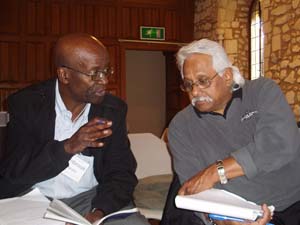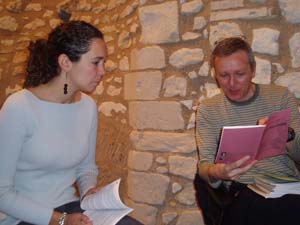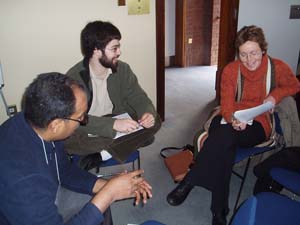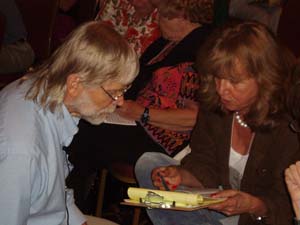| | The 28th Annual
International Conference on Critical Thinking
Conference Theme:
The Art of Teaching for Intellectual Engagement
The World's Oldest Annual Conference on Critical Thinking
July 21-24, 2008
Preconference: July 19-20 at the DoubleTree Hotel and Executive
Meeting Center, Berkeley Marina, California
The Center and Foundation for Critical Thinking have together hosted critical thinking academies and conferences for more than a quarter century. During that time, we have played a key role in defining, structuring, assessing, improving and advancing the principles and best practices of fair-minded critical thought in education and in society. We invite you to join us for the 28th International Conference on Critical Thinking. Our annual conference provides a unique opportunity for you to improve your understanding of critical thinking, as well as your ability to more substantively foster it in the classroom and in all aspects of your work and life.
THIS EVENT HAS CONCLUDED You May View Video of the Keynote Address below
The 28th International Conference will emphasize the art of teaching for intellectual engagement. The intellectually engaged student: - takes ownership of content through actively thinking it through.
- values questions more than answers
- seeks understanding over rote memorization
- assesses thinking for its clarity, accuracy, precision, relevance, depth, breadth, logic, and significance
- seeks to identify key structural components in thinking (purposes, question at issue, information and data, , inferences and interpretations, concepts and theories, assumptions and presuppositions, implications and consequences, points of view and frames of reference
- reads, writes, listens, and speaks critically
- questions the thinking of others and expects his or her thinking to be questioned by others
- thinks for himself while respecting and empathically entering the point of view of others
- locates ultimate intellectual authority in evidence and reasoning, rather than in authority figures or "authoritative" beliefs or texts Under (well-designed) instruction, students learn how to analyze thinking, assess thinking, and re-construct thinking (improving it thereby). The thinking focused upon is that which is embedded in the content of established academic disciplines. As a result, students so taught become actively engaged in thinking historically, anthropologically, sociologically, politically, chemically, biologically, mathematically, ...
As an integral part of these processes, students learn how to read, write, speak, and listen in a new way (critically). Most importantly, they learn how to learn, using disciplined reading, writing, speaking, and listening as modalities in learning. For a more in-depth look at the conference theme, visit the conference theme page.

Throughout our work we emphasize and argue for the importance of teaching for critical thinking in a strong, rather than a weak, sense. We are committed to a clear and "substantive" concept of critical thinking (rather than one that is ill-defined); a concept that interfaces well with the disciplines, that integrates critical with creative thinking, that applies directly to the needs of everyday and professional life, that emphasizes the affective as well as the cognitive dimension of critical thinking, that highlights intellectual standards and traits. We advocate a concept of critical thinking that organizes instruction in every subject area at every educational level, around it, on it, and through it.
The conference will consist in approximately 40 conference sessions offered over 4 days. Participants will choose in advance the sessions offered on days one and two, day three - afternoon, and day four - morning. At the conference, participants will choose from a number of concurrent sessions offered on the third morning of the conference. We invite both new and returning participants to join us for the preconference, to be held July 19 - 20, 2008.
All conference sessions will be designed to converge on basic critical thinking principles and to enrich a core concept of critical thinking with practical teaching and learning strategies. For fuller explanation of core critical thinking concepts review the Thinker's Guide Series or articles from our library.
Throughout our work we emphasize and argue for the importance of teaching for critical thinking in a strong, rather than a weak, sense. We are committed to a clear and "substantive" concept of critical thinking (rather than one that is ill-defined); a concept that interfaces well with the disciplines, that integrates critical with creative thinking, that applies directly to the needs of everyday and professional life, that emphasizes the affective as well as the cognitive dimension of critical thinking, that highlights intellectual standards and traits. We advocate a concept of critical thinking that organizes instruction in every subject area at every educational level, around it, on it, and through it.
|

 Preconference Session Titles - July 19-20 2008
Preconference Session Titles - July 19-20 2008  Day Two: Morning Choose one from the following sessions:
Day Two: Morning Choose one from the following sessions:  Day Three: Morning (invited concurrent sessions) Participants will select from a variety of concurrent sessions at the conference. These sessions focus on contextualization and documentation of critical thinking foundations. All concurrent sessions are invited.
Day Three: Morning (invited concurrent sessions) Participants will select from a variety of concurrent sessions at the conference. These sessions focus on contextualization and documentation of critical thinking foundations. All concurrent sessions are invited. Day Four: Morning Choose one from the following sessions:
Day Four: Morning Choose one from the following sessions: 